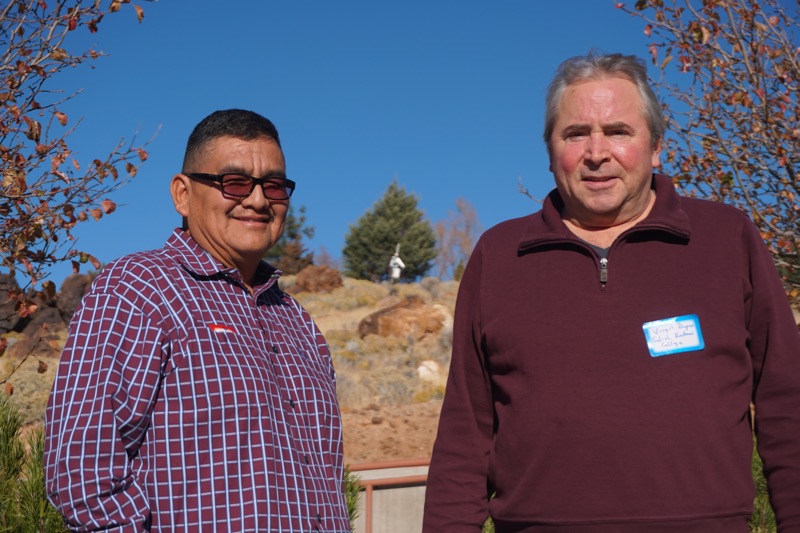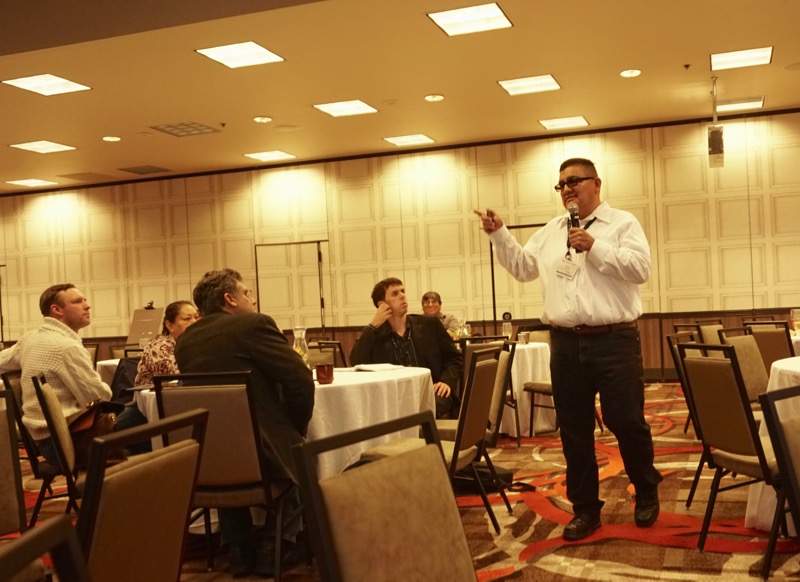
Enhancing climate resiliency on tribal lands
In Episode 11 of the Native Waters on Arid Lands podcast, we speak with Dr. Bonnie Colby about her research with the NWAL project in the areas of economics and tribal water resources. Colby is currently working on a guidebook that will help tribes navigate the process of setting up water sharing agreements. She is a professor of agriculture, resource economics, hydrology and water resources at the University of Arizona in Tucson.
Listen to the podcast and read below to learn more about Colby and her work. A transcript of this podcast is available here. You can subscribe to this podcast on iTunes, Google Play and Stitcher.
Dr. Bonnie Colby has spent more than 30 years working with students and tribal members on issues related to economics and water resources through her work at the University of Arizona in Tucson.
In her work with the NWAL project, Bonnie is doing research on the economic benefits and tradeoffs related to tribal water sharing agreements. Water sharing agreements are arrangements in which tribes share their water resources with nearby cities or non-tribal water users in exchange for payment.
Tribes often have senior water rights in their regions, Colby explains in the podcast. This is because most reservations were established before many of the non-tribal farms and settlements that are present today. By leasing reservation water to non-tribal users during droughts, tribes receive a source of income that can be invested back into the community in other ways.
Colby is now working with other members of the NWAL team, her graduate students, leaders from tribal colleges, and tribal government leaders to develop a practical guide for helping tribes to set up new water sharing agreements.
In setting up such an agreement, tribes must consider things like what a fair price would be for their water, and how their decision will impact future generations of people on the reservation. In return, tribes receive financial benefits, and become central players in the regional water dialogue, Colby explains. Colby hopes that through the creation of this guidebook, tribes will be better able to navigate the complex process of setting up a water sharing agreement.
“I would like to see tribal decision-makers feel more comfortable, confident, and really able to negotiate on behalf of their tribe’s interest in this very complex and specialized area,” Colby said.
Colby expects that a draft of this guidebook will be complete later in 2018, and the final version will be available here on the NWAL website for public use sometime next year.
Links to new research by Bonnie Colby related to water and tribal economies:
To learn more about Bonnie Colby’s work with the Native Waters on Arid Lands project, listen to podcast episode 11, below. Music for this podcast came from Podington Bear (song title: Bit Rio) on the Free Music Archive under a Creative Commons license. Funding for this project is provided by a grant from USDA-NIFA.
The post Episode 11: Tribal Water Sharing Agreements with Dr. Bonnie Colby appeared first on Native Waters on Arid Lands.

In episode 10 of the Native Waters on Arid Lands podcast, we talk with Steven Chischilly and Virgil Dupuis about their work with the Native Waters project in the sector of education. Steven is an Associate Professor of Environmental Sciences and Natural Resources at Navajo Technical University in New Mexico. Virgil is the Extension Director at Salish Kootenai College in Montana.
Listen to the podcast and read below to learn more about Steve, Virgil and their work. A transcript of this podcast is available here. You can subscribe to this podcast on iTunes, Google Play and Stitcher.
Steven Chischilly and Virgil Dupuis have each spent the majority of their careers helping to connect tribal students with educational opportunities in the sciences — Steven, through 21 years of teaching at Navajo Technical University, and Virgil, through 20 years as Extension Director at Salish Kootenai College.
During that time, they have become familiar with the challenges that many Native American students face when pursuing higher education. They have also seen firsthand the impact that completion of a degree program can have on students, their families and communities as students move on into successful careers.
As Steven explains in the podcast, he encourages all of his students at Navajo Technical University to take advantage of undergraduate research opportunities. Internship programs, such as those offered by federal government agencies, may provide housing, stipends and hands-on experience with real-world research projects. These experiences, Steven says, provide the students with valuable job skills.
“I’ve been doing this for 21 years now, and I think [what I like best is] making an impact on my tribe’s not only workforce but the educational legacy for the students that are there,” Steven said. “I like to think I’m making a difference in terms of helping them obtain an education on the reservation that they’re wanting, through the implementation of a curriculum that addresses tribal needs.”

Steven Chischilly speaks during the Tribal Education Forum at the Native Waters on Arid Lands 2017 Tribal Summit.
At Salish Kootenay College, Virgil works with students on research projects with direct benefits for the tribe — invasive species research, a community gardening project, and research on food sovereignty, to name a few.
“I enjoy the freedom I have working at the college,” Virgil said. “I work on projects that are highly interesting. They are relevant – they make a big difference in what we’re looking at and what we’re doing. I like to see students do well.”
As part of the Native Waters on Arid Lands team, Steven and Virgil are working to coordinate research efforts from their home colleges and universities in support of Native Waters project objectives. As Virgil explains in the podcast, the forestry program at Salish Kootenai has been collecting tree ring borings and sediment borings from high mountain lakes. They have applied for funding in cooperation with the Native Waters project to research paleoclimate and to investigate options for how tribes might manage forest resources in the future.
At Navajo Technical University, Steven is doing research to investigate the effects of climate change on the pinyon pine. He hopes to integrate this information into Native Waters project activities. He is also working on a project to get youth from the Navajo Nation involved with planting and preparing traditional foods, which is an area of interest for many Native Waters project team members.
To learn more about Steven and Virgil’s work with the Native Waters on Arid Lands project, listen to podcast episode 10, below. Music for this podcast came from Podington Bear (song title: Bit Rio) on the Free Music Archive under a Creative Commons license.
The post Episode 10: Educational opportunities in science with Steven Chischilly and Virgil Dupuis appeared first on Native Waters on Arid Lands.

In Episode 9 of the Native Waters on Arid Lands podcast, we speak with Vicki Hebb about the upcoming 2017 Tribal Summit, and elements of effective outreach that are important to her in her work.
Vicki works for the Intertribal Agriculture Council, and is a member of the Native Waters outreach team and a member of the Cheyenne River Sioux tribe in South Dakota. Listen to the podcast and read below to learn more about Vicki and her work. You can subscribe to this podcast on iTunes, Google Play and Stitcher.
Vicki Hebb has more than 20 years of experience working in tribal agricultural policy. As part of the Native Waters project, Vicki works alongside other members of the outreach team to organize the Native Waters on Arid Lands Tribal Summit. This year’s Tribal Summit will be held in Sparks, NV on November 15 and 16, 2017.
The Tribal Summit is an annual event that gathers tribal members and researchers from all over the Western US for workshops, talks and interactive discussions about issues related to climate change, water resources, agriculture and other topics. When planning the Summit, Vicki tries to make sure that the information that will be presented is relevant, applicable and interactive.
“I think that our goal for our tribal summit is to bring together tribes that are facing water issues and collectively bring them into a room,” Vicki said. “We really hope that every session, every agenda item, every agenda topic, is interactive. Because I think that we feel very strongly that we don’t want our speakers to speak at them.”
Vicki is a member of the Cheyenne River Sioux Tribe, and lives and ranches on 8,000 acres of land on the Cheyenne River Sioux Reservation in South Dakota. As she explains in the podcast, this reservation is very large — approximately the size of Rhode Island — and is located adjacent to the Standing Rock Sioux Reservation.
Although South Dakota is outside of the main focus area of the Native Waters project, water is no less essential to life in this part of the country, where people engage in dry land farming and rely the Cheyenne River for fishing and other purposes.
“At the end of the day, there’s not anyone on this planet that can deny that water is essential to life,” Vicki said.

Vicki Hebb’s ranch on the Cheyenne River Sioux Reservation in South Dakota.
Vicki works to get youth involved with some of her projects through the Intertribal Agriculture Council – and says that the experience of youth involvement can be invaluable. She believes that getting youth involved with water issues and other topics addressed by the Native Waters on Arid Lands project is especially important. That is why this year’s tribal summit will include Youth Day, a day of engagement and interactive activities for tribal youth at the Desert Research Institute in Reno.
“I think it’s important for them to see some of their leaders coming together, knowing that this is important, knowing that water is essential, how it affects their future, how it affects the environment. Once we start with that youth level, then we’re starting to build a responsible next generation.”
To learn more about Vicki’s work with the Native Waters on Arid Lands project, listen to podcast episode 9, below. Music for this podcast came from Podington Bear (song title: Bit Rio) on the Free Music Archive under a Creative Commons license.
The post Episode 9: The Tribal Summit with Vicki Hebb appeared first on Native Waters on Arid Lands.